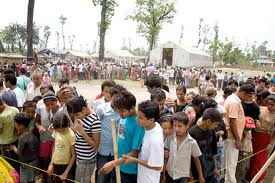 Over 58,400 refugees from Bhutan have already started their lives in new countries as part of the UNHCR’s resettlement programme. Some 54,900 remain in the camps, compared to about 108,000 before the resettlement programme began. Among the remaining population, over 41,300 persons have already declared an interest in resettlement.
Over 58,400 refugees from Bhutan have already started their lives in new countries as part of the UNHCR’s resettlement programme. Some 54,900 remain in the camps, compared to about 108,000 before the resettlement programme began. Among the remaining population, over 41,300 persons have already declared an interest in resettlement.
The European Commission and UNHCR concluded an agreement recently under which the Commission will contribute EURO 2,950,000 (equivalent to NPR 330 million) to UNHCR’s programme for the refugees from Bhutan in Nepal.
“This contribution for the period 2011 to 2014 will go towards meeting the ongoing protection and material needs of the refugees from Bhutan in camps in eastern Nepal under all sectors of assistance, including health and nutrition, education, legal assistance, sanitation, shelter and water, including the camp consolidation process,” stated a press release issued by the Delegation of the European Union to Nepal.
The European Commission has been continuously supporting UNHCR’s activities in Nepal since the beginning of the programme for the refugees from Bhutan.
“We are profoundly grateful for this generous donation which is a clear sign of the strong commitment of the European Commission towards the cause of the refugees,” said Stephane Jaquemet, the UNHCR Representative in Nepal.
Jaquemet added, “This important contribution comes at a crucial time when we are in the process of closing down some of the refugee camps and hopefully introducing development projects to benefit both refugees and host communities in Jhapa and Morang districts.”
The European Union (EU), consisting of the European Commission (EC) and the 27 EU member states, is one of UNHCR’s most important donors globally.
“The fate of refugees, in Nepal and all over the world, is a matter of particular concern for the European Union, and we are glad to be able to cooperate with professional implementing partners like the UNHCR which is, alongside other organizations in this project, obtaining a remarkable success in its programme for the refugees from Bhutan in Nepal” said Gérard Van Driessche, Chargé d’Affaires, EU Delegation to Nepal.
The administrative consolidation of the three Beldangi camps and the closure of Goldhap camp were completed in early 2011 while Timai camp is in the process of being closed. By the end of 2012, Khudunabari camp will be closed, leaving only two camps (Beldangi and Sanischare) remaining out of the original seven camps.
